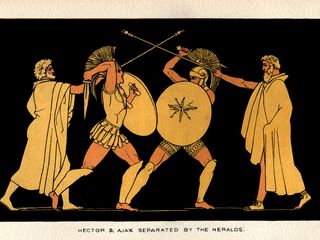Wisdom
How to Live Your Destiny Like Zelenskyy in Your Own Life
Don’t be captive to your fate.
Posted April 1, 2022 Reviewed by Tyler Woods
Key points
- World-level happenings sometimes teach big lessons on many levels.
- Ancient wisdom still applies to today’s events.
- Carl Jung reminded us of the necessity of doing the inner work to express our higher nature.
World-level happenings sometimes teach big lessons on many levels. The horror of Ukraine was not a necessary event. It was chosen by a man who’s fated to display on a world stage what has been building up in his inner world for years. Some were sure they knew what would be coming out of Russia. Many of us hoped differently. And so the throwback move of a tank and rocket-lead invasion of a bordering people is a shock. Weren’t we over this as a species? Apparently not.
Ancient wisdom still applies to today’s events.

2,500 years ago, the Greeks had a worldview and a pre-psychology that names for us what we see in eastern Europe now. In their hugely popular and sophisticated theater life, they would express the power of our psychological inner energies as they play out in human life. These inner energies, millennia later, were eventually named the unconscious—those influencing patterns our mind is not aware of. This is now mainstream parlance, we all know what it means when we hear, “He has an inferiority complex,” or, “She is kind of narcissistic.” The Greeks gave these energies names like fate (Moira) that defines and limits us, destiny (Proeirsmos), the developmental drive within us to express our highest nature, and flawed perspective or blind spots (Hamartia).
What we see on the world stage, tragically so, and in real-time: A leader with the blind spots of hamartia who seems fated to create tragedy; and another who may be destined to a larger life of purpose, even heroically so. Those who live out and are captive to their fate refuse to—or are incapable of—reflecting upon their inner life to find the “better angels” of their nature, Abraham Lincoln’s term from his famous speech about the Civil War. In those dark times, Lincoln reminded his fellow citizens to pay attention to the light within, rather than exacting an outer vengeance. If any of us stay true to our unique version of this light we will serve the roles that constitute a noble life of destiny, even on the smallest of stages.
Psychologist Carl Jung put the necessity of doing the inner work to express our higher nature succinctly: “The psychological rule says that when an inner situation is not made conscious, it happens outside as fate.”
Author Pat Conroy put it this way in Prince of Tides. If we don’t work on self-awareness we will “hum the melodies of those dark anthems that send us resolutely toward our appointments with a remorseless (fate).”
Volodymyr Zelenskyy’s well-known biography is yet to play out fully, of course. He has a crisis to live through and many years ahead. But if there is a candidate for destiny on the planet now it has to be him. The comedian, then actor who played the role of president, then the election to president in real life, and currently a mobilizing force in the free world for the stance against tyranny—what a script!
We observe the loss of life, forced exodus, and onslaught that Zelenskyy tries to hold off through the courage and determination of his countrymen and women. He may, as all this plays out, have greatness thrust upon him as he travels in a short time from funny jokes to sustaining leadership. He will need to take the noble path and stick with it, but his early actions are encouraging. So we pull for him and his family and all the families of his country.
The lessons for all of us here? At this still early stage we can take inspiration from Zelenskyy’s acceptance of his challenge, and we can be shocked into acknowledging the dark truth of how a person with power can loose mayhem upon the world. Those two states—inspiration and shock—are important takeaways. At a personal level, we can apply these lessons in the far less dramatic dimensions of our day-to-day lives. What the Greeks taught 2500 years ago holds for all humanity: we all have choices around our own fate and destiny. We can take radical responsibility for our lives.
Simply put, we must find our better angels. We do so by not letting the “remorseless anthems” of our conditioning/fate tell us who we are. We can rise above the circumstances that limited us in earlier years, the bad influences of childhood development, and even learn from our trauma. We thus allow our destiny to find us. We devote our energies to a higher purpose and lead lives beyond the pursuit of power, consumption, and self-reference. We can make the world a little better for our being here, in our everyday social settings—the jobs where we work, the families we love, the communities where we live.
The popular spiritual teacher Richard Rohr put it this way: “What we don’t transform we transmit.”
What is your choice, fate, or destiny? What inner light waits to be found?


